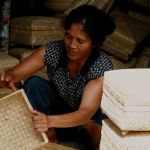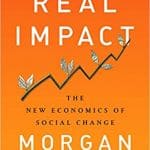Weekly Roundup: $5 Beats Free, SunFunder Rises, and Asia’s Investors Love Impact
There’s no such thing as “free” vaccines, according to Jason Cone, executive director of Doctors Without Borders (MSF) in the United States, in explaining why his organization turned down Pfizer’s offer to donate pneumonia vaccine in developing countries.
MSF’s decision could seem controversial – pneumonia is, after all, the world’s deadliest disease among children – unless you’ve read Cone’s rationale. He said Pfizer and GlaxoSmithKline (GSK), the only producers of the vaccine, keep the price artificially high – together earning $36 billion on it since 2009 – while refusing to negotiate lower prices even in poor countries.
Donations, Cone said, are often used to keep other manufacturers from entering a market, thus limiting price competition. They also help firms’ marketing departments justify unreasonably high prices elsewhere. And they give manufacturers, rather than health care providers, control over when and how their products are distributed, risking interruption of ongoing campaigns in the field.
“Pfizer should lower the price of its lifesaving pneumonia vaccine for humanitarian organizations and all developing countries to $5 per child. Only then will we have a meaningful step towards saving children’s lives both today and in the future,” Cone writes. It will be interesting to see if anyone mounts a serious counter argument … and if Pfizer and GSK relent to MSF’s bold stance.
SunFunder Sets On a New Fund
SunFunder announced it has closed $21 million of a planned $50 million “Beyond the Grid Solar Fund” to invest in solar enterprises in developing markets. The first financing close included institutional investors MCE Social Capital, The Rockefeller Foundation and Overseas Private Investment Corporation (OPIC).
SunFunder is a debt financing fund for solar companies mainly operating in Africa and Asia. In a statement, the firm said it’s moving “lock step” with a maturing market. While the cost of solar is dropping as supply grows, more complex models – such as pay-as-you-go home solar systems and commercial distributed energy projects – require more debt financing, the firm said.
Speaking of OPIC, the U.S. government’s global investment group is prohibited from taking ownership stakes in foreign ventures, pushing it out of a lot of deals and limiting its access to high-impact opportunities to finance development. But as Devex reported this week, OPIC Chief Executive Elizabeth Littlefield indicated it might be time to ask Congress to re-evaluate that policy, which was established by law more than 50 years ago.
“[Our] policies were designed in the 1960s and haven’t really been adjusted since,” she said. “We need a 21st century toolkit of instruments that are appropriate for financial markets – like equity.”
Millionaires in Asia – Impact Investing’s Biggest Fans?
Wealthy people in Asia are the most socially conscious investors in the world, according to a new report from the management consultancy firm Capgemini. The report found that high net-worth individuals (HNWIs, defined as people with at least $1 million in investable assets) in the region – excluding Japan – were more active in social-impact investing than their global peers, allocating 37.3 percent of their portfolios to these investments vs. the 31.6 percent allocated by HNWIs in the rest of the world. Which countries topped the list? “The highest portfolio allocations for social-impact investment were made by wealthy individuals in Indonesia (45.8 percent), Malaysia (43.6 percent) and China (40.8 percent),” the report said. What’s more, it found that 58.2 percent of HNWIs in the region intend to increase their social-impact investment allocations in the future, compared to 50.4 percent in the rest of the world.
New Platform Hopes to Help Close $2.5 Trillion Gap
This week the United Nations announced the launch of a new platform to help scale up innovative finance solutions that support the Sustainable Development Goals (SDGs). The initiative will support the identification and piloting of innovative finance instruments, and aims to engage stakeholders ranging from governments and development finance institutions, to philanthropic organizations, entrepreneurs and investors. It’s part of a multi-pronged effort to link the development and business communities’ efforts in support of the ambitious – and costly – goals. As Rockefeller Foundation president Judith Rodin put it when the platform was announced, “To realize the SDGs we need to foster a new era of collaboration and coordination … business as usual is not an option to close the $2.5 trillion annual funding gap in developing countries alone.”
Special Report: Top 200 Sustainable Mutual Funds https://t.co/zUEQipUz3A #MFQuarterly pic.twitter.com/CXKILreM4A
— Barron’s (@barronsonline) October 10, 2016
Spotlight on taboos
Part of the process of making a healthier planet is removing stigmas that limit health, specifically in developing countries. We recently saw two creative ways of doing just that.
Rodney Muhumuza writes in NWI.com about the Uganda Network of Young People Living with HIV beauty pageant, an annual affair designed to teach people in Uganda, where an HIV diagnosis can be “proof of irresponsible sexual behavior and a source of shame,” about AIDS discrimination. There’s a related event for men every year.
Miss Young Positive 2016 is Tryphena Natukunda, 18, who talked about her mother wanting her to keep her condition a secret growing up, discouraging her from swallowing her antiretroviral medicines in public, even among distant relatives.
Then there was the creative effort to remove the taboos associated with menstruation at India’s Calicut Medical College. Yes, medical college.
Kavya Menon wanted to talk about installing a sanitary pad dispenser in the girls’ bathroom, but learned that such matters aren’t discussed in public. The absurdity of the situation led the college’s literary club to start a menstruation-themed haiku and poetry competition. They received almost 90 entries, including this one:
She loved biology.
Wanted to be a doctor.
Then biology took over.
She never saw school again.
Athira Unni, Pune
“Menstrual health is a serious issue for the 355 million women of reproductive age in India. Only 12 percent use sanitary pads, and tampons are rare. For the rest of India’s menstruating women, a reusable rag is the only option,” writes Vidhi Doshi in The Guardian.
We never considered a haiku – or a beauty pageant, for that matter – a pathway to better health, but we’re now convinced.
A $90 Trillion Opportunity to Fight Climate Change
A new report from the Global Commission on the Economy and Climate found that the world is expected to invest around $90 trillion in infrastructure over the next 15 years. According to the report, “These investments are needed to replace ageing infrastructure in advanced economies and to accommodate higher growth and structural change in emerging market and developing countries” – and these investments could either contribute to or combat climate change. “The types of infrastructure we build – coal power plants vs. wind farms and solar arrays, for example, or mega-highways vs. public transit systems – will determine whether we stay on a high-carbon growth path or move towards a climate-smart future,” the report said, emphasizing that investing in green infrastructure can also contribute to economic growth.
A New Guide and a Big Survey
Social Finance and the W.K. Kellogg Foundation launched “New Tools to Amplify Impact: A Pay for Success Guide to Building Nonprofit Capacity,” described as “a summary and how-to guide for nonprofits looking to use the emerging tools of Pay for Success to assess their capacity, and to craft a compelling social and economic case for their programs.”
CECP, a coalition of more than 200 of the world’s largest companies, released “Giving in Numbers: 2016 Edition,” a major annual analysis of corporate societal engagement based on a survey given to 272 companies. According to Carmen Perez, CECP director of data insights, the report pointed to “the growing importance of the corporate societal engagement office in leading companies around the world, which should come as no surprise when increasingly, business performance is tied to social responsibility.”
FYI – Financial Inclusion Week is coming
Next week, Oct. 17-21, is Financial Inclusion Week 2016. An initiative of Financial Inclusion 2020, a global movement to advance financial inclusion organized by the Center for Financial Inclusion at Accion (a NextBillion partner), the week mobilizes stakeholders across the globe to “organize and participate in conversations exploring the most important steps to achieving full financial inclusion.” This year’s events will focus on “how to ensure that clients are empowered and protected in a financial ecosystem that has moved beyond brick and mortar to cell phones and internet delivery channels.” Check out the many events on tap – including several online – here.
Photo by the UK Department for International Development, via Flickr
- Categories
- Health Care



